Guiding Principles
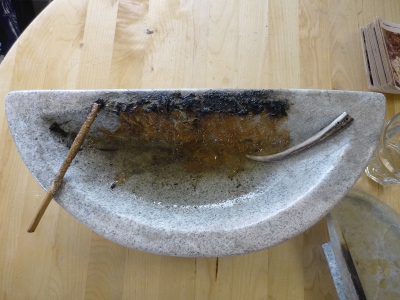
Piliriqatigiinniq
This value emphasizes working together for a common cause. We recognizes there are many organizations and people dedicated to the well-being of Nunavut’s children and youth. We are committed to listening to alternative perspectives. We also recognize the value of communication with the public, our key partners and stakeholders to build a sense of common purpose.
Qanuqtuurniq
Inuit highly value qanuqtuurniq, or being innovative and resourceful. We embrace qanuqtuurniq to ensure we consider all solutions to issues affecting individual young people. We are committed to practicing alternative problem-solving and lateral thinking. Our systemic advocacy work also provides us with opportunities to make innovative recommendations that can improve the well-being of children, youth and families.
Pijitsirniq
This value is about serving and providing for family and community. It’s about leading through doing for other people. It’s about serving others for the greater good. We are here to serve Nunavummiut in this urban setting as a whole.
Inuuqatigiitsiarniq
Inuuqatigiitsiarniq guides us to respect and care for other people and our relationships so that we can all live together in harmony. We are committed to addressing issues in a way that respects all those we work with. We show respect and care for people by encouraging them to express themselves, according to their age and maturity. We respect the role healthy families and communities play in raising children to become whole human beings.
Tunnganarniq
Tunnganarniq emphasizes the role being open, welcoming and inclusive plays in fostering positive relationships. We are dedicated to taking the time for people, making ourselves available and creating an environment where Inuit feel comfortable.
Aajiiqatigiinniq
This value means decision making through discussion and consensus. Inuit children, youth and families help guide our decision making. We always begin our work with government departments through respectful discussion.
Pilimmaksarniq
Pilimmaksarniq is about learning and mastering new skills through observation, mentoring, practice and effort. We are committed to looking for opportunities to encourage Inuit children, youth and families to acquire new skills. One of our key areas of work, individual advocacy, includes coaching young people in how to advocate for themselves. We also provide opportunities to young people to act as youth advisors to our office.
Avatittinnik
Avatittinnik is about respect and care for the land, animals and the environment. Inuit enjoy a long-standing relationship with the land. Inuuqatigiit is also committed to environment-friendly practices. We believe respecting the environment today, demonstrates respect for future generations.
Adapted from SOURCE: https://rcynu.ca/families-public/what-guides-us/inuit-societal-values
Aboriginal Head Start Six Components have helped to define the vision and practices at the Inuuqatigiit – Centre for Inuit Children, Youth and Families. All of the Inuuqatigiit programs are guided by these same six basic components to ensure quality programming.
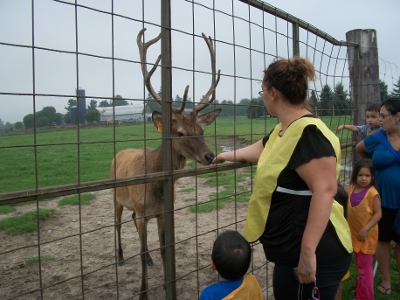
1. Education
Goal: To prepare Inuit children for school
Activities:
- Variety of child-centered activities: art, sand, dress-up, computer, games, blocks, puzzles, puppets, books, science, music, balls.
- Children’s activities that will help develop basic concepts i.e. numbers, letters, syllabics.
- Monthly field trips.
- Circle activities in English and Inuktitut.
- Child assessment: observations, progress reports, parent-teacher interviews, and child development referrals, i.e. speech therapy.
- Weekly circles with the Family Literacy Program.
- Weekly book lending opportunities.

2. Nutrition
Goal: To encourage healthy eating habits using a variety of nutritional foods, including country food.
Activities:
- Healthy Breakfast/ Lunch prepared on-site and served daily
- Nutritious snacks prepared on-site and served daily
- All foods are based on the required Food Groups in the Day Nurseries Act, Canada’s Guide to Healthy Eating
- Quarterly menus sent home and are posted on the Parent Bulletin Board
- Allergies posted and foods that trigger an allergy not served to that child
- Country food served as available
- Children’s activities about nutrition and country food
3. Parent/Guardian Involvement
Goal: To include parents in all aspects of the Head Start program.
Parent/ Caregiver Activities:
- The Parent Orientation Night
- Parent volunteers
- Doing crafts/sewing
- Ongoing communication via phone, parent letters, email, and communication book
- Monthly program calendars
- Special family events: parties, outings, field trips, lunches
- Parenting courses and workshops
- Parent-Teacher meetings
- Membership
- Board of Directors
- Participation/attendance at The Annual General Meeting
The foundation of success for the Sivummut Head Start is the involvement of parents and guardians in the program. Parents and guardians are the child’s primary teachers and they have the most important influence on their child’s development. It is the parents’ right and responsibility to be involved in all aspects of the planning, development, implementation and evaluation of the program.
There are many ways to contribute to the program such as assisting teachers in the program, helping in the kitchen or office, building maintenance, going on field trips, helping the teachers prepare materials, sewing, doing crafts, snow removal, helping at social events and acting as a Member of the Board of Directors.
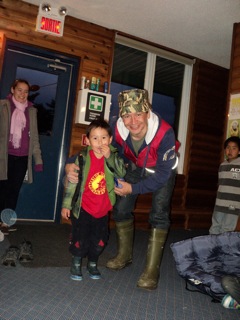
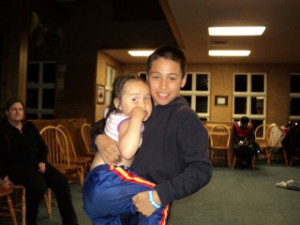
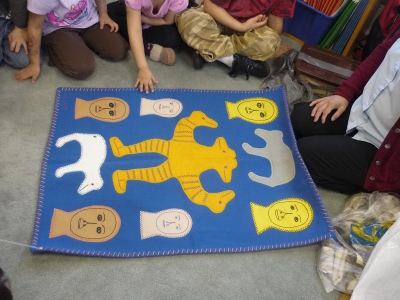
4. Culture and Language
Goal: To promote the retention of the Inuit culture and language.
Activities:
- Community sharing: Elders, storytelling, sharing traditional knowledge, sewing, etc
- Program for children based on Inuit culture
- Children’s performances in community i.e. National Aboriginal Day
- Inuktitut language used daily
- Traditional play items: bone games, string games, ulus, drums, amautis, atigis, kamiik, Inuit dolls
- Development and use of culturally appropriate activities and materials.
- Cultural events such as the annual “Inuit Day” in February
- Circles in Inuktitut i.e. songs, games, books
- Use of syllabics in the classroom i.e. labeling pictures and objects
A key part of the Sivummut Head Start Program is the cultural and language component. Activities, materials, special events, food, and family workshops reflect the Inuit culture. Inuktitut is an official language of the program and used throughout the day. It is the policy of the Inuuqatigiit Centre for Inuit Children, Youth and Families to employ Inuit staff whenever possible.

5. Health Promotion
Goal: To promote and model healthy lifestyle choices for parents and children.
Activities:
- Focus on the development of the “whole” child.
- Workshops on health/nutrition topics
- Dental care program (screening and varnishing)
- Policies and procedures to ensure health and safety of everyone
- Smoke free environment
- Children’s activities promoting health and safety
- Regular outside play and physical activity for the children
- Monthly ‘Well Child’ checks
- Referrals when needed i.e. Wabano Centre for Aboriginal Health
6. Social Support
Goal: To provide advice, support and information to parents. To strengthen a parents support network and provide information.
Activities:
- Regular contact with parents
- Informal one-on-one support
- Voluntary home visits
- Formal assessments on children when required or requested
- Individual program planning for children when required
- General referrals for parents
- Clothing/toy donations and exchange
- Parent support
- Ensured confidentiality
©2024 by Inuuqatigiit -- Centre for Inuit Children, Youth and Families | All Rights Reserved.

